
What is it that we know so well and cannot speak? What is
it that we want to say and cannot tell? What is it that keeps
swelling in our hearts its grand and solemn music, that is
aching in our throats, that is pulsing like a strange wild
grape through all the conduits of our blood….?
—Thomas Wolfe
_____________
It might as well have been a city on the moon, for all I knew of it growing up. And even after I was grown up. Countries in Europe were never even remotely on my radar screen, not in any real sense. Sure, I knew those countries existed, like Germany. And I read about Berlin, because of the Wall. But not Muenster. I might well have lived my whole life and never even heard of the place. And you don’t know what you don’t know, until you do.
And right at twenty years ago, I learned a little bit of what I didn’t know. It was sometime during my first year at Bob Jones University, that timid and self-conscious time when I was wearing my detestable straight-cut suit coat to classes, as any good plain Mennonite would. And now and then, while studying at the library, I searched for any books that would shed a little more light on my Anabaptist heritage. I don’t know what I was looking for. Some original writings, maybe. And to its credit, BJU had a few volumes tucked away on some remote shelves in the religion section. I picked them up and paged through them. Sat there and read chunks from different chapters.
All I ever knew about the Anabaptists, all I’d learned growing up, had come from two sources. From the sermons of Amish preachers, and from the Martyr’s Mirror. My spiritual forefathers were always a persecuted people, always harassed and hunted and tortured and drowned and burned at the stake for their faith. That’s all I had ever heard and that’s all I knew. Or thought I knew. Until I paged through those few books at the library at BJU. And it just jumped out at me. Some of those vaunted Anabaptist forefathers weren’t all they’d been cracked up to be, in those sermons. Nah. Some of them were real scoundrels. Radicals. Riff raff. And it was startling to me. It really was.
Because some of them had not been all that quiet or peaceable. Some of them had taken up the sword. Some of them had embraced violence, and inflicted blood and fire and death on others. I sat there, shocked. It’s like saying black is white, I thought. It can’t be. Anabaptists can’t be violent like that. They’re the ones everyone else hunted and killed. Both the evil Catholics and the Protestants. I’ll have to tell Dad about this. I wonder if he knows. I bet he does, and never told me. And I kept on reading. (Side note: The next time I went home to visit, I told Dad about my discovery. Did you know that, that some Anabaptists were crazy and violent? I asked him. He folded his arms and chuckled. “Har, har. Those weren’t real Anabaptists,” he said. Well, uh, yeah they were, I said. They were all re-baptizers. You can’t just pick and choose which ones were “real” or not. And we left it at that.)
The most brutal Anabaptist violence against others came down in the city of Muenster. There, a whacked-out firebrand of a leader named Jan von Leiden and his followers seized the city and proclaimed a new heaven on earth. Of course, the local king was not at all amused. Actually, he was quite furious. He besieged the city. But Jan and his followers weren’t about to give up their newfound heaven. They met force with force and violence with violence. Fire with fire and blood with blood. And they ruled the terrified inhabitants of Muenster with savage force as well.
It was a different time back then, obviously. And it’s tough, to grasp how it really was so long ago. Those were turbulent and dangerous days. You could easily lose your life, for thinking wrong. It was the struggle of the western world, to reach the place we now are. A place where you are free to think and believe what you want. Mostly, anyway. A post-Christian world, one might say, in Europe. Where most people recoil from any kind of personal profession of faith. A natural progression, maybe, a reaction to the cesspool of corruption that will always flow when people are taxed against their will to support any state-sponsored church. Any entity connected to the state will be corrupt from its inception. By nature. There’s no way it can be anything else, because the nature of the state is always corrupt and evil. But I digress. Bunny trail territory, right there.
The siege of Muenster dragged on for four brutal and bloody years, from 1533 to 1536. I won’t go into a lot of details. Let’s just say things got really hard and really messy inside those walls. Jan von Leiden ruled with an iron fist. Forced the city residents to either be re-baptized or face something a whole lot worse. Like being expelled from the city, turned over to the king’s murderous troops, lurking right outside the walls. Or stay and get murdered right in the city. There were no good choices for the common people trapped inside those walls. Food was scarce. And many of the men fell, either from starvation or during battles. Their widows needed husbands. So Jan took sixteen wives to himself. And lived in luxury, bedecked in gold and all kinds of finery, as the city starved around him.
Long-term, Jan could not win, of course. The king’s forces eventually broke through. The people inside Muenster were too weak and too starved to resist, after four years. And the king made an example of the leaders, so an uprising like that would never happen again. Jan and two of his henchmen were tortured to death in the public square. And this is where it all gets just a little creepy. After they had been dispatched by stabbing after having chunks of flesh torn from them with hot iron tongs, the king had the bodies of Jan and his two buddies stuffed into three cages. And hung them high on the steeple tower of the old church where Jan had ruled and preached and dictated the lives of others. Hung the cages up there on that steeple, and let the bodies decompose to the elements. As a warning to others. Don’t even try to rebel against the powers that be. Look what happens to those who did.
And that’s why I wanted to go to Muenster so badly. Because those cages still hang on that church today.
Thursday morning. I woke up feeling a little strange. And a little sad. It was all flying by so fast. The first week, more than half over now. And Leuphana University, the reason I had even been invited here, that was over, too. I’d leave today. Probably never see this place again, I thought. I puttered about, packing my things into Big Red and the little burgundy carry-on. The bags bulged at the seams. Heavier, now. People had given me gifts, here and there. A book. Another book. This and that. It all had to be packed in. After checking the room top to bottom to make sure nothing was left behind, I pulled my bags out and down to the front desk. The nice lady smiled at me. Well, she wasn’t actually that nice, but cordial enough. And she spoke a little English. I’m leaving, I told her. Is there anything I have to sign? “The University took care of everything,” she assured me. I thanked her and lugged the bags outside, into the little courtyard. Maryann and the taxi should be here right soon. At nine, she’d promised me.
We had plenty of time to catch our 9:30 train, Maryann had claimed. We had our tickets. It’s ten minutes, to the station. But I insisted on leaving early. Get there, so you’re there. It doesn’t hurt to wait. That’s what I do at airports, too. The few times I fly, I mean. Get there early, and just hang out. Wait, make it tight, and who knows what will happen? A little traffic jam will make you miss your flight. Or your train. The taxi showed up right on time, and we were off. I looked out the windows, got my last glimpses of Luenberg as the taxi cruised down the deserted streets. Ascension Day. A holiday. Not a lot going on. I looked around and thought, this town sure has been good to me. It really has. And now I’m leaving it. You absorb one thing as it comes at you, you walk through it. Then it’s gone and the next one comes.
I don’t know how efficient it actually is, what with the government running it and all, but the train systems I saw in Germany and later in Switzerland were pretty astounding. The coaches are roomy and comfortable. The trains run on time. And if you miss the one you wanted, another train will come along, usually before long. Our train hissed in and stopped. People piled off first, then on. Maryann found the right coach, and I followed her on board. We found our reserved seats in a little walled-off room, by the windows. I want to see the land, I had told her. And she got us window seats. I pretty much just looked out to see what I could see as the train slid out, picked up speed, and swooped across the ancient landscape. Muenster, I said. I can’t believe it. Here we come.
It’s built to last, pretty much everything you see in Germany. Their building codes would drive me crazy, I’m sure. So many hoops to jump through. These people don’t even know what a pole building is, I thought. Back home, the buildings I sell, those poles are warrantied not to rot in the ground for forty years. Forty years around here, they’ve barely started using the building. They’d never construct something so, uh, temporary. If you build something, make sure it has a good chance to last for a good long time. Generations. Hundreds of years, if not a thousand. Or more. Doesn’t matter, really, what it is. Houses, office complexes, old churches. And they all flashed by as we rolled on and on. Farmers toiled in the fields on their tractors, tilling the earth. Just like back home, I thought.
And something else stood out that I surely hope won’t be around in a thousand years, although the Germans probably built them to last that long. They stabbed into the sky like giant aliens, great forests of them, hundreds of feet high. One of the ugliest atrocities ever devised by humans. Giant windmills, with those huge three-pronged propeller blades that never seem to be turning when you see them. I couldn’t believe the Germans got taken by that scam. Those things are just flat-out appalling, I grumbled to Maryann. Why would they install something so revolting? Gashes in the sky, is what they are.
It’s the price of buying into the political correctness of the “Green” gospel, those massive, abominable windmills. All to get away from traditional forms of energy, to “save the earth”, this Garden of Eden that humans have defiled. And are in the process of destroying. Within a few generations, the time will come when people will look back, aghast, that such an obviously devious scheme was ever foisted on the populace. That such atrocities were ever allowed to mar the natural beauty of their ancient landscape. They will tear them down, people in the future, they will tear down those monuments to colossal stupidity as if they never stood. And they’ll shake their heads in disbelief at this hopelessly naïve generation. They will. That time will come. I am convinced of it.
The train pulsed along. Maryann and I talked and talked, even though I was peering out the window most of the time. She told me of how it was, to live in Germany, her adopted country. How she first came over, years ago, as a student. And pretty much stayed on. She talked of the classes she taught in American Studies, about writing in general, and my book. Now and then, the train slid into some station along the way and stopped. Passengers got on and off. And after one such stop, she told me. “Muenster is next. It’s coming right up.”
And it stirred inside me, the nervous tension and excitement. Here I was, approaching the site of some really dark history from my people. Here, this is where all that terrible stuff unfolded, evil stuff that was never told and never taught. I can’t express, really, why it was so important to me. But it was. I wanted to see the church. I wanted to see the cages. Stand there and look at them. Stand on the ground where the evil had come down from all sides. Confront it. Speak it.
The train slowed and stopped. We struggled out of the little compartment with our luggage. Walked out onto the platform and down the steps. A stranger in a strange land, I stayed close to Maryann as we plunged through the crowds and headed toward the station entrance. Outside, we approached the line of taxis, and boarded the first one. Maryann told the driver the name of our hotel, and off we went. Less than ten minutes later, we unloaded in front of a classic old hotel close to the old town section. We walked in, and signed in. I pulled out a roll of Euros and paid up front for our rooms. Might as well get rid of some of these Euros Sabrina gave me, I figured. I can’t spend them back home.
Half an hour later, after unpacking and settling in our rooms, we headed out. A beautiful perfect day. My trusty messenger bag was strapped across my shoulder, as always. With my passport, some cash and my iPad, to take some pics. And a copy of my book. I always carried one of those in my bag, just for anyhow. “The old church is right over there,” Maryann pointed to a steep Gothic steeple piercing the skies. “That’s where the cages are.” OK, I said. Let’s go. I can’t wait to see them. We walked down the worn brick sidewalks. All the stores were closed for Ascension Day. Crowds of holidayers strolled about. Down the sidewalks we walked, around a curve. The old church loomed. I scanned the steeple. No cages, from this direction, I said. “I think they’re on the other side,” Maryann replied. We walked on.

Approaching the “cage church”.
It was a huge, looming, gloomy church, with a tall, tall black steeple. We walked past the front, around to the courtyard on the other side. And Maryann stopped, and pointed up. “There they are,” she said. And I stood there and looked up. And there they were. The cages of Muenster. Right there, above the huge steeple clock. Hanging there, where they’ve hung for almost five hundred years. I stood there and looked and looked. Stared and stared. The cages. There are the cages. You don’t understand, I said to Maryann. This is part of my history they never told me. They never taught it. Anabaptists were always poor innocent people, in my world. Always persecuted because of their faith. Always hunted like animals. They never told me this story. They never told me of the dark side. That’s why it’s so important for me to see for myself.

In the presence of the cages.

The cages up close.
I stood there on those ancient bricks in the sunlight and absorbed the place. For a long time. This, then, is where it happened, that dark chapter in the history of my spiritual forefathers. Back in those turbulent, turbulent times, back when people pretty much from every side had blood on their hands, one way or the other, in some form. This was the spot. Anabaptists. Rebaptizers. They rose up in this city, and they hung up there in those cages, I thought. Wiedertaufer, the Germans call them. It’s a dirty word, in mainstream church history. From both Catholics and Protestants.
And I thought, too. Because of what happened here, maybe that’s why the Martyr’s Mirror has so many stories of persecution and death. Because you can bet the powers that be went after the Wiedertaufer with full force, after what happened here. Didn’t matter if they claimed to be nonresistant, as in fact a great many if not the majority of them were. They were deeply tainted by Muenster. And I can understand why. Not from today’s perspectives. But from a tiny glimpse of the perspectives of the times. We can’t judge history that far back by our standards. We can say with absolute certainty that certain actions were wrong. But we can’t actually judge those people, not without taking into consideration the times in which they lived. Had we been there then, would we have been any different? It’s simply hubris, to claim we would have been.
The cages are completely empty. No shreds remain of the bodies that were encased in them. They have decomposed completely and scattered to the winds. Someone once told me that in the early to mid-1800s, some sun-bleached bones could still be seen in the cages. But time and the elements have claimed even those. Jan von Leiden and his two thug henchmen have been wiped completely from the face of the earth. Only the stories remain, of who they were and what they did. That, and the cages, silent specters, witnesses to the awful fate to which they were condemned.
After twenty minutes or so, we slipped through a little side entrance into the old church. The interior was just huge and breathtaking. Off in one corner stood an elderly nun, at a little information table. She was chatting with another tourist. We waited our turn respectfully. After the tourist wandered away, we approached. She smiled at us in welcome. Her name was Sister Huberta. Maryann spoke to her and the two of them rattled back and forth in German so fast that I hardly understood a word. “The cages,” Maryann told her. “This man is a descendant of the Wiedertaufer. He came to see the cages.”
“Oh, yes, the Wiedertaufer and the cages,” Sister Huberta was all smiles. Genuine smiles, too, considering where I came from. She opened a folder and showed me. Sketches of the evil Jan von Leiden and his two main henchmen. And she told us. “They ruled the city for four years, from 1533 to 1536. This church is where he preached and ruled. Things were not good. He beheaded one of his wives.” A fact I had read, and knew to be true. I chatted with Sister Huberta, through Maryann. Any chance I can get up in that tower and actually look at those cages close up? Her face fell a bit. “No, because of legal issues.” Maryann translated. That figures, I thought. Legal issues. I smiled at Sister Huberta. Then I asked. Would you take a picture with me? “Of course,” she told Maryann. “But not inside the church. I’ll walk outside with you.” Do you think she’d hold a copy of my book for the pic? I asked Maryann. I have one right here in my bag. So Maryann told her. “This man comes from the Amish and wrote a book about it. Would you hold it for the picture?” Of course she would, she beamed.
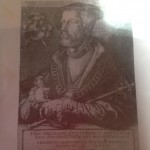
Jan von Leiden as depicted in Sister Huberta’s folder.
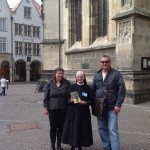
Maryann, Sister Huberta, and me.
Catholics are supposed to be all guilt-ridden, I know. Amish guilt is very close to Catholic guilt, and I’ve been there, done that. But Sister Huberta exuded mostly joy, not guilt. She was simply welcoming and joyful, even to a descendant of the despised Wiedertaufer. She chattered right along with Maryann, then smiled and wished us well and took her leave. Walked back to her post inside the church.
We strolled back into the church and looked around. The pulpit tower was still there, the spot where Jan had stood and preached. That, and the remnants of the bases of many statues of saints he and his rabid iconoclastic followers had smashed. Off to one corner stood a couple of tables with candles. A stack of unlit candles off to one side, by a little collection box. For a small donation, you could light your own candle, say your own prayer. I clinked a few Euros into the little collection box. Then Maryann and I both lit candles and stuck them on the tables with the others. I didn’t think to say a prayer, so I didn’t. My prayer was in my heart. And before the Lord, the heart speaks powerfully without words, whatever its condition, whether you want it to or not.
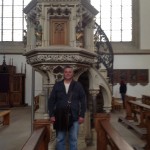
Jan von Leiden preached and ruled from this pulpit.
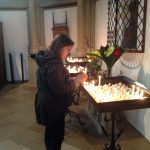
Maryann planting her candle.
Our adventures with the cages weren’t quite done, though. We strolled on out to the courtyard toward the old shops lining the streets. And an elderly gentleman approached us. “You are from the Wiedertaufer?” he asked. I don’t know how he knew that. Maybe he’d been watching us, or maybe he had been inside the church and overheard our conversation with Sister Huberta. “Yes,” Maryann responded, motioning at me. “He is.”
“I live here in Muenster,” he said proudly. “Back in such and such a year (It was in the 1990s sometime), Muenster was voted the most beautiful city of its size in all the world.” He beamed. We beamed back. How nice. But he had something more to tell us. “Right here,” he said, pointing down to the bricks on which we stood. “Right here is the spot in the public square where they tortured and killed the three Wiedertaufer leaders, before they hung them up there in those cages.” I looked down. And there was a little plaque, inserted among the bricks. Marking the spot where the scaffold had stood. And again, I just stood there in awe, absorbing this moment and this place.
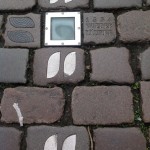
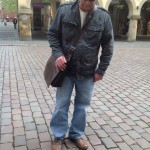
“You’ll want to go to the Museum,” the man said pointing. “It’s just over there, a few blocks. They have some displays of when it happened, there. With real things from that time in our city.” Maryann chatted with the nice man for a few more minutes, then he turned and strolled away, quite satisfied with himself. I looked at him as he walked away and marveled. He was the only person on the whole trip who popped out of nowhere to speak to me like that, then just disappeared. It was more startling in retrospect than it seemed right at the moment. Later, I thought about it. He was waiting for us. What chance was there that he would show up to show us this spot? And direct us? What chance was there of that?
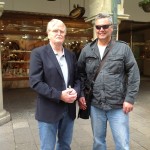
The stranger who showed up to guide us.
After a quick bite of pizza and a glass of beer in the courtyard right below the cages, we set off for the museum. There were a dozen or more rooms of displays. Numbers six and seven dealt with the Muenster Wiedertaufer rebellion and the cages. We walked through slowly, I drank in every display. The information signs were all in German. I pestered Maryann. Was sagt Das? Was sagt Das? What does this say? And she cheerfully translated for me. They had exact replicas of the three cages, hanging there. Odds and ends of this and that, including a set of torture tongs. The sign said these were likely the actual tongs used to tear chunks of flesh from Jan von Leiden and his two deputies. They hung there, on the wall. There were many other stern signs, too. In English and German. Do Not Touch. But I touched those tongs. And a few other forbidden items. I think Maryann was a little horrified at me. It didn’t matter. I was here. And I was going to experience this all the way.
By late afternoon, we returned to our hotel. My room was small but very nice. You could open up the window from the third floor and lean right out over the street. Where I come from, you could never do that. But right that moment, I couldn’t appreciate my surroundings much. I was just exhausted, physically and emotionally. After a brief nap, I met up with Maryann and we walked back out to find dinner. We stopped at a very nice little outdoor café. And afterward, we strolled through the lit streets and sidewalks of the old town, window shopping. The whole setting was just surreal.
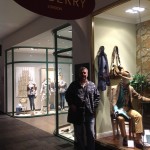
Night walk. Window shopping. Muenster. Duetschland.
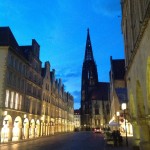
The “cage church” at night.
The next morning, after a scrumptious breakfast in the hotel dining room (European hotels got breakfast down, big time), we took a last quick walk about the old town. Past the dark old church where the cages hung, a few blocks to another huge church. I shudder a bit to think where all the labor and materials came from, to build those huge old monuments of churches, centuries ago. Taxing the poor peasants to death, probably. That got the materials. And I don’t know, but I bet the laborers were pressed into service for the church, when they would have rather been out there working for themselves. I don’t know that. But I suspect it was so.
We walked into the massive old stone church. A huge statue stood there, toward the front, towering over everyone who walked in. “St. Christopher,” Maryann told me. “The patron saint of travelers.” Great, I said. This is an apt place to come, the morning I take off on my own for the first time. I felt the tension inside me from that. So far, someone had always been with me, to guide me, to take me, to show me. This morning, Maryann was heading back to Luenberg, back to her work and school. This morning, I was heading on over to Mainz, to speak at Johannes Gutenberg University that night. I could do it, travel alone. It was all set up. My hotel in Mainz was just across the street from the train station, they told me. Simple. Just walk out, look for the King Hotel, and go in. They’ll be expecting you. Still, I figured this little stop to see St. Christopher was a good thing. Can’t hurt, to cover all your bases. We each lit a candle in that church, as well.
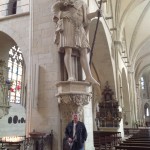
St. Christopher and the Christ child.
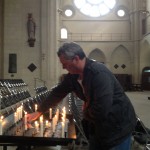
Planting my candle.
Back, then, to the hotel, to pack up to leave. And right on time, the taxi pulled up outside. We loaded our luggage, got in, and headed to the train station. I thanked Maryann over and over, profusely. Thanks for bringing me, for taking the time when you had a lot of other very important things that needed your attention. Thanks for realizing how important this was to me. And she gave me a hundred detailed instructions about trains, train schedules and such. We walked out to the platform. Our trains were departing minutes apart, going in opposite directions. Mine pulled in first. “Good luck. You’ll be OK,” Maryann assured me. We hugged good-bye. And I stepped onto the train for Mainz. All by myself.
A stranger in a strange land, I had seen and lived wondrous, wondrous things. And where I was going, there would be many, many more.
**********************************************
A couple of housekeeping notes. First, my last blog post was too long. I apologize for that. I wanted to cram in at least the first four days, the traveling and the Leuphana experience. It was too much to condense any more. And before I knew it, there were eleven pages of writing. Plus the pics. It was about as bad as an Amish preacher who doesn’t know when it’s time to shut up and sit down. Y’all come here to read a few pages on a blog, not a freakin’ chapter in a book.
And that’s why I broke this blog down to the single experience of Muenster. It would have been too much, to try to cram Mainz and its aftermath into this narrative. I figure there’s probably two more blogs about the trip. One for Mainz and beyond (still in Germany), and one for my week in Switzerland. I may wander off onto other trails before they all come out, but I’ll get them written eventually. Bear with me. And I promise. No more long-winded blogs.
I had planned to travel up to Aylmer to see my parents before my trip to Europe, but somehow it didn’t work out. So I told Dad I’d come up sometime in June. It’s looking like it might happen next weekend. I’m looking forward to seeing him. Just talking to him. I haven’t seen him since he’s read the book. And I want to print out and show him a few color photos of scenes from the trip. He’ll like that a lot, I think.
We’ll see how it all works out, and how the writing of it will come.
Share

Suddenly he thought of Germany, and thought of it with
intense longing. Of all the countries he had ever seen,
that was the one, after America, which he liked the most,
and in which he felt most at home…It was also a country
above all others whose mystery and magic haunted him.
—Thomas Wolfe
_____________
I don’t know what it is, I grumbled to myself, that it always has to be like this. Just throw some stuff in a bag, and go with that. You don’t have to pack your entire wardrobe. Underwear, socks, a few shirts, some jeans, and maybe a pair of khakis and a jacket. Should be simple enough, for a two-week foray. Sadly, though, those little musings went right out the window the second I actually started packing for my trip.
I have a big old red suitcase on wheels, part of a set Ellen and I bought way back. She took the smaller pieces, and left me with the big one. And it’s always worked well for me on road trips. Throw in anything you think you might need, and that way you’ll have it with you. But this wasn’t a plain old road trip. This time, I was heading out on a jet plane. A large plane, to places I’d never even dreamed of seeing before. And since I was lugging the big red suitcase along, I might as well fill it.
I needed a carry-on bag, too. Keep a change of clothes and a few other necessities with you, in case the big bag gets lost. So the week before departure, I wandered into the mall to check out luggage prices. I was pretty horrified. Little carry-on’s with wheels ran right at $100 or more. No way I was going to pay that. Then good old TJ Maxx came through for me. A Chaps carry-on with a pull-out handle and rollers for fifty bucks. Sure, it was a deep burgundy color, but who cared? Burgundy and red was cool with me. Matching luggage has never been even remotely on my priority list.
I waited until Friday night to pack, the night before leaving. Stuffed in way too many shirts, my trusty old sports jacket, and a couple of shirt-jacs, and my black camo fleece jacket. I like to stay casual. It’s way more comfortable. Or maybe I’m just old and set in my ways. I packed my vitamins and my cold medicine. Still nursing my savage head cold, I went to bed late, my head buzzing from the cold meds. I tossed restlessly all night.
I woke up early, tense and nervous. This was the day. The day that was a long time coming. I was leaving for Germany. Setting out on a journey unlike any I had ever seen before. It was a big thing, in my mind. Still nursing my cold, I got up and followed my normal routine. Putzed around, ran down to Sheetz for coffee. Packed the last stuff in my bags. Fretted about what I’d forget. Departure time was 6:10 PM. And I left my home around One that afternoon. Drove over to Graber Supply, to park my truck there. A friend had agreed to run me to Philly, so I wouldn’t have to pay to park for two weeks at the airport.
He dropped me off at British Airways Departure gate shortly before 3 PM. And I walked into an airport to board a plane for the first time since Tyndale flew me out to Chicago back in 2010. I can do this, I thought. I will do this. The counter guy scanned my passport, tagged my luggage, and handed me my boarding pass. Directed me to security, where I knew they’d be waiting for me. The TSA thugs.
I approached them as a lamb. Whatever happened, I would take it. I would tell it later, too. My demeanor must have been sufficiently submissive, because they didn’t single me out. I did what they told me to do. Took off my shoes. Took everything out of my pockets, placed all my stuff in little tubs. Then stepped into a space-age booth and stood there, shoeless and beltless. Holding up my hands up to fit the profile on the glass. An utterly submissive citizen. No peep from me. They weren’t done, though. After passing through all that hassle with no trouble, one of the thugs on the other side approached me. Spoke. “I’m going to do a patdown,” he told me. OK, I said. He felt around my stomach a bit. Didn’t dig down, much further, with his hands. “You may proceed,” he said. So I did. As any good sheep would.
There’s a special law out there in the universe about me and planes. An obscure law, but one that always holds true on flights of over two or three hours. Wherever I sit, there will be a child within ten seats, more likely six. A child, anywhere from an infant to, oh, say, five years old. And that child will always have a voice. A great loud orator’s voice.
I crossed myself as I stepped onto the intercontinental jet, a huge tub of plane. The crowds slowly jostled through Business Class. I looked enviously at the broad expanse of space in those seats. It sure would be nice, to land up in one of those. But no, on back we went, through a curtain, to economy class. Rows and rows and rows of seats, tightly packed together. By some miracle, I landed up in an aisle seat. At least I could stretch my legs. And in front of me, three seats away to the right, the appointed flight orator was warming up. A four-year-old, probably. A tousle-headed little urchin with puffy lips. He was not happy at all. And he didn’t care who knew it. The great orators of history had nothing on this kid. Someday, he’ll probably end up in politics, which would be a sad waste of such a powerful, piercing voice.
I settled into my seat, beside a nice middle-aged couple. And the plane took off, right on time, right to the minute. Off we swooped, then up and up to 38,000 feet. It’s a different world in there, in that plane. Everyone is just so used to flying that no one thinks of the million little details that must connect and coordinate precisely to make it even possible. I thought of that, though. And it was just a strange flight, all around. First, they came trundling around with a little cart. Whiskey, wine, or beer. Take your pick. It’s part of the trip. No extra cost. I asked for scotch, and the nice man poured a little bottle of Johnny Walker Red into a plastic cup, added the ice I had requested, and handed it right over. This is wild, I thought. Very soon, another cart came trundling. Food, this time. A full meal, I forget what it was. Edible enough.
After that, we just settled in. I slumped in my seat. Dozed off. Jolted awake to the orator’s howls, now and then. A few hours passed. We had taken off in the evening, and flown into the night. And suddenly, it was dawn. Right outside the window, the sun was coming up. I glanced at my watch. It was around 1 AM, home time. I slumped back into my seat and slept. Off and on as the orator roared and roared again. They should have a special walled-off section for people traveling on planes with little children, I thought groggily. Why has no one thought of this before?
And right on time, we approached Heathrow Airport in London. That’s another “holy” place I’ve always wanted to visit. England. But I never got there yet. My time here would be brief. Just changing planes to my destination. A layover of just over an hour. It should be simple enough. Of course, it turned out to be far from simple. Heathrow is an evil, evil airport. I walked in cheerfully and quite innocently. How hard could it be, to change planes? The gate I needed probably was close by somewhere, I figured. I figured way, way wrong. It was a jungle, a minefield, that place. I looked for my boarding gate. No such number to be found. So I followed the signs. Downstairs, a crowd was gathering. I stood, forlorn and puzzled. A nice lady approached me, an airport employee. I told her where I needed to be, and she waved me toward the crowd. “Take the train,” she said. Train? In an airport? A minute or two later, the little train swept in. I packed myself into the crowd on the second car. The train bucketed along at frightful speeds for a few minutes, then slid into a station. I poured out with the crowd. Just walk. Go where they’re going.
Up a huge escalator and round about, we plunged into a big, big room, like a herd of stampeding cattle. There, people stood on point, glancing at every person’s ticket, and then directing them to the right place. I approached and showed my ticket to a balding bespectacled man. “Down that line,” he said in clipped tones, pointing. “But, no, wait. I’m putting you in the express lane.” Express lane. That sounded ominous. Am I in a time crunch, here? But faster is always better. Don’t ask questions. Just go. I shot through the crowds, up another escalator, and circled around to a security line. Security? I just got off a plane. Why more security?
There was no choice but to walk forward. At least you didn’t have to remove your shoes. I dropped my stuff into plastic tubs, including half a bottle of water I plucked from my shirt-jac pocket. The tall guard lurking nearby stirred and swooped in. “You cahn’t take this on the plane with you,” he barked accusingly, waving the bottle around in a most agitated manner. OK, OK. I waved dismissively. Throw it away, you blithering idiot, I thought to myself. Earn some of that colossal waste of funds we’re throwing at people like you to harass people like me. It’s water, for crying out loud. You know that as well as I do.
And then I was through, and followed the signs downstairs to my gate. A bus was parked outside, not a plane. I approached the young lady sitting at the station by her computer, a Muslim girl in full head covering. Timidly showed her my ticket. Am I in the right place? The English are often rude and thoughtless people. But this girl was not. She smiled and told me to have a seat. She would announce when it was time to board.
And she did, about twenty minutes later, after a small crowd had assembled. We all walked out and piled into the bus. The driver slid the bus along, on the left side of the road, and pulled up next to a small jet, parked way out on the edge of things. A stairs had been pushed up to the jet. We got off the bus and walked up the stairs onto the plane. Outdoors, like they used to do way back when commercial flying was in its infancy. That’s how Heathrow treated me. Primitive, that’s what that whole operation was.
It was a short flight to Hamburg, so of course no orator showed up. They never do, when it doesn’t matter. I felt tense and strange inside. This was the second leg of the journey, the short jaunt over. Next stop, Germany. The plane swooped down. We landed and bumped to a crawl. I had arrived. I walked into the airport and stood on German soil for the first time in my life. Exhausted and drained, I stared about me. The signs were all in German. Everyone around me spoke in German. A wild strange journey it had been, indeed, but here I was. It‘s been a long, long road from the horse and plow to this point, I thought. A long, long road.
Trundling along with the little burgundy carry-on, which turned out to be an excellent, excellent purchase, I followed the signs to Baggage Claim to find my big red suitcase. As inefficient as they were at Heathrow, I more than half expected it hadn’t made it. On the way over, I stopped at a little booth to show my passport to a nice man behind the glass. He glanced at my document, and welcomed me to Germany. That was real nice, I thought. Customs sure was simple, right there. I walked on out, and sure enough, Big Red was bumping along on the baggage belt. By some miracle, the Heathrow people had transferred it to the right plane on time. I grabbed it and followed the signs to the exit. Sabrina must be waiting. I was running a little behind. And just as I approached the exit, three stooges in uniforms accosted me with merry waves. Gleefully. “Hey, stop. We must inspect your bags.” I hadn’t cleared customs after all, according to these guys. And since I had no reason to doubt them, I followed them back into another room. I’m a sheep, I thought. At least as far as these guys will ever know, I am.
The head stooge was quite full of himself. Pompous and abrupt. How long would I be in the country? A week, I said. “Well, we must inspect your bags.” Go ahead, I said. I lifted Big Red onto the little table. Opened my suitcase. The Pompous One pawed through my stuff. Asked a few more inane questions. And found me harmless enough. “All right. Take your bags and go.” I took them and went. Buncha’ thugs, I thought grimly. I detest borders. All borders.
I walked through the exit, and there they stood. Sabrina and a colleague, Lynette. Sabrina introduced us to each other, and we trundled my bags out to the parking garage. Lynette had driven her car here to meet me. We chatted as we walked out. My head felt woozy. Yes, I had a good flight. I’m feeling a little strange, from the time change. I can’t believe I’m in Germany. I want to see what there is to see. I want to see the land.
We drove out of the city, through little villages on two-lane highways. German roads seemed quite normal. People drove on the right, just like back home. And just like that, it hit me. An overwhelming weariness. I hung my head and almost drifted off, as Sabrina and Lynette chatted and chatted right along. Here is such and such a thing. This area is known for thatched roofs on houses. They’re getting more and more scarce these days, because of the insurance. But those thatched roofs are out there, and we’ll see some.
Well, who wouldn’t stay awake for that? I roused myself. We puttered past fields and through village after village. The lay of the land reminded me of Lancaster County. Black rich fertile earth. It smells the same, wherever you are in all the world. German farms are very different from what I’m used to seeing. The buildings are clustered in little villages. Barns, houses, stockyards, chickens pecking about. Way back, the farmers clustered together like that for mutual protection. From their village buildings, they go out and till their fields. It’s quite unique, from what I’m used to. But I guess it works. They’ve been doing this for far longer than there were farms in my country.
We cruised along, and soon enough, Lynette pointed. There. And I saw it, for the first time in my life. A real thatched grass roof on a real house that someone lived in. It was surreal, that little road trip from the airport. It really was. My head drooped, now and then. Not wanting to be rude, I always pulled myself back. And then, just as I was sliding off into delicious sleep, we stopped and walked into an ancient church in a little village. And I came back from where I wanted to be, to see this sight. Wake up, and look around.
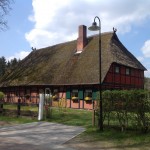
Thatched-roof house across from the old church.
A while later, the ladies dropped me off at a nice little hotel close to the University. Sabrina helped me check in, and I trundled off to my room on the third floor. A single room, they called it. Small, with half a bed. Nice enough, except for one thing. No wireless connection. Well, they had wireless, but they charged for it. And that’s my only grumble about the place. But it was what it was. I threw my bags against the wall and collapsed on the bed for a short nap. At six, Sabrina and her family showed up to take me out into the old town, and to find something to eat.
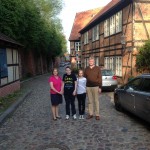
The Völz family.
They were all the same as I’d remembered them from last August. Hans-Jurgen, Sabrina, and their children, Maximilian and Emily. I sat up front and we headed out to old town Lüneburg. It’s a small city, way up in northern Germany. I’d never heard of it before. But like every city, town and village in the country, Lüneburg has its own rich, rich history. It was once an extremely wealthy town, because of its salt mines. Wars have been fought over salt. It was a critical component for curing and preserving meat. And the Lüneburg merchants grew fat and rich. The area is quite proud of its past.
We walked through the old town. I just couldn’t grasp it, the history of the place. This would be the case throughout the entire two weeks I spent in Europe. How old it is. Little churches and vast cathedrals and lots and lots of old houses dot the landscape, places far older than the country I live in. It’s hard, to process all that when you’re around it. To really grasp what you’re seeing. That first night, I stood by a surviving section of the thick old brick wall that once surrounded the town. That’s almost biblical, a walled town. It’s so strange, I told Sabrina and Hans Jurgen. All that material and effort to protect people from intruders who would attack and kill them. Humans are their own worst enemies.
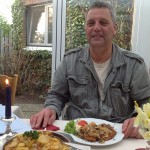
Schnitzel smothered with mushrooms. Excellent food.
We ate a little later, at a small bar and Gasthof. They wanted me to try the authentic German schnitzel, a flat, breaded pork product that reminded me of the tenderloin sandwiches I’ve eaten in small cafes in the Midwest. That, and fried potatoes, an old Amish staple. German food is heavy food. But delicious. And you must drink German beer with it. That’s pretty much a universal law in the country, near as I can tell. I’m not much of a beer guy, never have been. I drank more beer during my two-week trip than I have in the past five years, total. It was just part of the scene. And who am I to argue?
After dinner, Hans-Jurgen and Sabrina took me out to see the new home they had built about five years ago. A lovely house, designed to last a thousand years. I sat outside with them in the cool evening air, and we sipped one more beer and talked. They dropped me off at my hotel then, and I crept timidly up to my room on the third floor. I grumbled savagely to myself about the lack of wireless. Can’t check my email, or Facebook, so I might as well get some sleep. The bed was good and firm, and I quickly drifted off into fitful slumber. That was Day One. Tomorrow, the University.
The next morning, I awoke and got ready for the first day of the University adventure. Downstairs, in the hotel’s little restaurant, a great breakfast feast was spread out. One thing the Europeans got down is breakfasts in hotels. The tiniest rattiest place lays out hard-boiled eggs, three or four cheeses, plates of ham and and other sliced meats, a half dozen types of bread, granola and yogurt, and juice, and of course, strong black coffee. I’m not much of a breakfast guy, but who can turn down a spread like that?
Later, I drifted out through the courtyard and waited for someone to fetch me for the first class. The sidewalks swarmed with students, most of them on bicycles. The sidewalks there have designated bike paths, and these people whooshed back and forth and up and down with great abandon. Seemed like they would run right over you, if you didn’t watch your step. Time passed. I’m tense and nervous anyway, in strange settings like that, so I got a little tenser and a little more nervous. Come on, whoever was picking me up. That’s all I need, to show up late for my first speaking gig at a class, after all the trouble they went to, to get me over here. Time crept up, closer and closer to twelve. The class started at 12:15. Bicycles kept rushing by. Everyone knew where they were and where they were going. Except me. I stood there forlornly, clutching at my messenger bag strapped diagonally across my shoulder. I kept most of my money and my passport in that thing, and it stayed on or very close to me at all times. Lose it, and I’ll never make it back home.
I can only speak from where I was on this trip, and from what I saw. My first impression of the Germans around me was that they seemed rather dour and reserved. I didn’t see a whole lot of smiling going on. Maybe it’s those long, hard winters they have up this far north, I thought. And right then, she arrived. Julia, Sabrina’s student assistant. “Hi, you must be Ira,” she greeted me, smiling. I am, I said, smiling back. “Sorry, I’m running a bit late. We’re close to the classroom, though, so we’ll be on time.” We crossed the street and followed the bike path/sidewalks onto the University. I gaped around a lot. Great hordes of bikes stood parked in rows and rows. Hundreds and hundreds of them. Crowds of students strode purposefully about.
There wasn’t a whole lot of time to get nervous about speaking to a group of students in a foreign University, so I didn’t, mostly. When you’re walking through a door like that, stay who you are. Don’t try to be who you aren’t. But mostly, stay as calm as you can. We got to class a few minutes early, as Julia had promised. Sabrina met us and introduced me to her colleague, Maryann. Their classes would be combined today. They were all smiles. “The students are eager to hear you and meet you,” they both claimed. Yeah, yeah, I thought. Who’s eager to hear anyone lecture about much of anything? The room was packed out with probably about sixty students. Mostly young ladies, all of them quite beautiful, with a few guys scattered in here and there. I’m totally cool with that, though, speaking to roomful of beautiful women. I sat at a table up front. A few latecomers slipped in and sat at the back. All right, I thought. Here’s what I came for. Here we go.
Sabrina called the room to order, and introduced me. I saw that at least a few of the students clutched copies of my book. Wow. Maybe they really were eager to hear what I had to say, I thought. Sabrina’s introduction was quite long and quite complimentary. And then she turned to me. I smiled and thanked her. The students clapped a bit. And I just sat there and talked to them. When it comes to my book, and the Amish, I don’t have to prepare a lot. I know the subject matter.
And it was pretty much as it is back here at home, except for the location. American Studies in Germany are conducted in English. These students were all fluent in English. And I spoke to them in English. They looked at me as I spoke, focused on my words. And it seemed like Sabrina was right. They were eager to hear what I had to say. I’ve never been to Europe before, I told them. I’m excited and grateful to be here with you. You really have no idea how big a deal this is to me, to be here. It’s just flat out wild. My friends back home are quite in awe, as I am, too.
And then I spoke about where I came from, my childhood, and how it was to be raised Amish. A horse and buggy world, surrounded by modern society. And how it was to be torn from world to world as I left and returned and left again. About twenty minutes or so in, I read a passage from the book. And then I opened up for questions. I always like to do that, so you can talk about what people actually want to hear. And boy, did they have questions. Can I go home to see my family? Of course. How are my parents? Where is Sarah?
They grappled a bit with some of my answers. What do I think of the Amish now? I admire some the things they have preserved, like their work ethic. The West has lost that, mostly, now. What it is to really work. I deeply respect the culture, even though I could never, never live like that. That’s not the issue. To me, the issue is always freedom. I am free. The Amish should be free to live as they choose. To raise their children as they see fit. Who do the children belong to? I asked. The parents or the state? To me, it’s not even close. They belong to the parents. And if you tell me that Amish children don’t have much of a chance in life, I’ll tell you this. I was raised that way. It was really, really tough, to break away. But I did. I went on and got an education. Sure, I was older than the average student. But life’s not fair. People should be able to live freely as they choose, as the Amish live, if they want to. It’s none of my business what choices they make. As long as the freedom is there to make those choices.
This was a strange message, I think, to some of the students. Here I was, defending the people I had come from. When they knew from reading my book how I had almost lost my mind, breaking away. But that’s how I feel, and that’s what I told them. For true freedom to exist, there must be the ability to make free choices, even if the choices others make might be appalling to us.
Time flowed, and very soon, the hour and a half had passed. You’re welcome to bring your books up to sign, I said. And they lined up, those who had their copies with them. It all just seemed so surreal. Here I was, in a German University, signing copies of my book. And these people didn’t seem that reserved. They were very friendly, they stood there and smiled and smiled at me. And chatted and chatted, as well.
Afterward, Maryann took me to a nearby bakery, where we bought sandwiches and water and walked to a nearby park to eat. Like Sabrina and Lynette, Maryann was an expatriated American. She had lived in Germany for years, she told me. We chatted about a lot of things. She asked what all I’d like to see in Germany. I’m not going to make it, but I’d really like to see the city of Muenster, I told her. That place has some really dark Anabaptist history, the kind of stuff that was never taught to me. Because they were violent. I never knew that until after I was in college. I’d really like to go. But I guess I won’t make it.
After that first morning, things just came at me like a whirlwind. That evening, I spoke at a local high school, or Gymnasium, as they call it over there. A group of probably thirty or forty students and faculty. I’m always a little nervous, speaking to high school kids, because they tend to be unfocused. These kids were not. They locked right in as I talked, and actually came up with a good many very intelligent questions. After that was over, I signed a copy of the book I had brought along and donated it to the school library. And then a group of friends and faculty took me out to eat in old town Lüneburg.
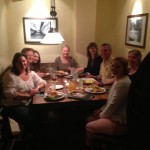
Pub meal on Monday night.
I sat there with them in a pub that was older than the country I was born in, and we just laughed and chattered like old friends. That night, I tried fresh German asparagus, or Spargal, as they call it. White asparagus. The short harvest season was in full swing, and farmers were selling their produce from little farm stands. My food was very good, especially to a guy who never has been much of an asparagus fan. Washed down with a large glass of beer, of course. The evening came to a close, then, and Sabrina dropped me off at my hotel. Tomorrow would be pretty open, except for the big talk scheduled for Tuesday evening. The big talk, the one they made the posters for, the one open to the public.
Sabrina’s colleagues all genuinely welcomed me, at least the ones in her immediate group in American Studies. In Germany, the academic levels are a little different than here. These ladies all had post graduate degrees, but I get confused as to exactly where they were in the pecking order. A Doctorate in Germany is not the top. You have to have something more, to call yourself a Professor. A Post-Doctorate Doctorate, maybe, or something like that. Whatever. These people were all quite friendly and insisted that I call them by their first names. They all teach classes in the American Studies Department at Leuphana. And I can’t say enough about how gracious and welcoming they all were. Every one. “We’re so glad you could come,” they claimed. You have no idea, I replied. You have no idea how big a deal it is for me to be here. To be invited like this. It’s just beyond anything I’ve experienced before.
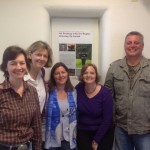
Sabrina’s gang, from Left: Lynette Kirschner, M.A.,
Dr. Maria Moss, and Maryann Henck, M.A.
The tension of that night’s talk pulsed inside me a good bit. But I pushed it back, mostly. I’ve spoken to large college audiences before, I told myself. The biggest crowd was at Grove City, last fall. You know your stuff. Don’t sweat it. But still, I felt it, the looming time, out there shadowing me like a ghost. This is Germany. These are German students. They’ll have high expectations.
Sabrina and her colleagues not only welcomed me, they insisted on showing me around the area. Ah, you don’t have to do that, I said. At least let me put some gas in your car. They wouldn’t hear of it, none of them. And that afternoon, Lynette was scheduled to show me about the town a bit. “The Salt Museum,” she suggested. “Would you like to see it?” Of course, I said. The Germans seem to have museums scattered about in every town, and even in some small villages. So early that afternoon, off we went. What could there be to see in a salt museum? Quite a bit, it turned out. Salt was the gold of the town for many centuries. Only in the 1980s was the mine finally shut down. The exhibitions were quite good.
After that, we took a walk about the old town. A certain section of Lüneburg is sinking, because of the mines below ground. Those streets have a lot of very old, very crooked houses. Lynette chattered on about the history of many of the places we walked past. The old houses were just fascinating status symbols of a time long ago. We also entered and toured an old church. Lynette filled me in on the story of the place. There are so many places and so many stories.
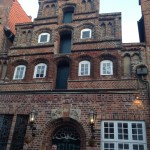
A typical home in the old town. A person with wealth built this home a long, long time ago.
And then it was back to the hotel. Evening approached. I changed into my khaki pants and jacket. Put on a long-sleeved shirt. Gotta be half presentable tonight, I figured. I had suggested that perhaps I could wear jeans and the jacket, since writers are generally considered weird anyway. No one cares how they’re dressed, and besides, jeans and jacket are quite presentable about anywhere, if you ask me. But Sabrina had kindly hinted that it might be good to dress up a notch from jeans that night. OK, I said. So I did.
Sabrina picked me up at six, and we drove over to the auditorium. Not a real large place, probably 175 seats or so. Sabrina had asked me earlier. “Would you donate a copy of your book? We’ll get the students to sign their names on slips of paper, and have a raffle when you’re done.” Sure, I said. A student stood outside each doorway, handing out the slips. And the place began filling up. About five minutes before go time, it was pretty much packed out. And still more people came. At 6:15, the steps up both sides were crammed with people, seated and standing. Sabrina seemed delighted and surprised. “We don’t usually have this many people showing up,” she told me. Usually forty to fifty is a good crowd.” Well, there were a heck of a lot more than forty to fifty people crammed into that room. I paced about nervously and leaned back against the wall behind the podium. It was time. Past time.
And then it just came down. Sabrina approached the podium with her notes. Again, her introduction was long and very complimentary. “Let’s welcome Ira Wagler,” she wrapped it up. The crowd clapped politely. Now it was my time, my turn. This right here was the reason they had brought me over. For this moment. I stepped up with my book and my page of scrawled notes. And I looked into that crowd and talked.
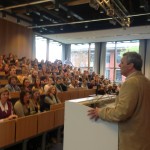
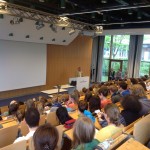
And it was good, pretty much right from the start. I speak better when there’s a little tension inside me. Keeps me focused. It’s a balance, really, between just the right degree of being relaxed and tense. I spoke of the things I always speak of. Where I come from, that world. How it was, to live in that world as a child. And how it was, to grow to the point where you wanted and desperately needed to see what was outside. A whole lot of faces, all of them, I think, were focused intently on me as I spoke. And time slid by. I glanced at my watch. I would make it through.
I read two passages that night, for the first time ever. Much of Chapter 12, about Rumspringa. And the first date scene with Sarah. That’s the one I usually read. And after the second reading, I wound it down. Opened up for questions. The part I like the most. And they came, oh, yes, they did. Boom, boom, boom, and boom again. The threads led from one point of interest to another.
And I slid it in, kind of tongue in cheek, for the first time over there. I judge a country by whether or not the Amish would be allowed to live in it in peace. They could not live here in Germany, I told the audience. Your country is not free enough. You all need to work on that. I have a lot of issues with America, primarily because it is the most murderous, warmongering country in the world. I’m as anti-war as my father ever was. More so, if that’s possible. But I deeply respect the fact that the Amish can exist there. There aren’t a whole lot of places where they’d be allowed to live as they do.
Question after question poured in, and finally Sabrina walked over to the mike. “One more question, then it’s time to close it down,” she declared. So I took one more. In Germany, they often show appreciation by clapping their open palms down on the table. As I wrapped it up, Sabrina walked to the table beside the podium, lifted her hand high, and clapped it down. No, whacked it down. Hard. The students didn’t follow her lead. They didn’t clap the desk tops before them. Instead, the whole room erupted into real clapping. And it went on and on. (It was probably only ten seconds or so, but to me it seemed a lot longer.) I stood there, smiling gratefully and a little sheepishly. I even waved a bit. Still they clapped. It was a weird moment. And a beautiful one. What a fantastic crowd. Finally I stepped back up to the mike. Thank you. Thank you. If anyone has a copy of the book they want me to sign, I will be honored. The applause slowed and died. A minute later, about twenty-five people had lined up, holding their copies of the book. I took a moment to speak to each one. Thanked them for attending. Thanked them for reading my stuff.
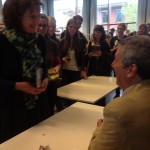
Afterward, it was out to another ancient pub, hanging with good friends, eating fantastic food and drinking a tall, tall glass of Weizen beer. That was the night the waiter rebuked me for pouring ketchup over the thin but delicious potato cakes on my plate. “No ketchup, that’s bad,” he scolded. I grinned at him and kept right on shoveling.
And the next morning, at eleven, I spoke to my last group at Leuphana. A class of probably thirty-five students. A writing class. Life writing, they called it. I sat there at a table up front, totally comfortable in jeans, shirt-jac and camo T-shirt, and just talked to them. About how it is for me, what it is to write. How it all began, right here on this blog. And how this place is where I can speak my voice right now. So that’s where I’m writing. In your story, you have to be honest about yourself, I told them. Otherwise, your narrative won’t be credible. Don’t play the innocent victim. Few are innocent. I’m sure not, in my story. After class, a few of the students lingered to chat and ask questions. And get their books signed. I was honored.
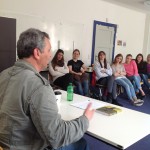
Off then, to lunch with Sabrina and her colleagues at the dining hall. We sat around a table with a few other teachers. The food was quite tasty, for cafeteria food. And then we walked over to Sabrina’s office. Maryann accompanied us. “Come with me,” Sabrina said. We walked down the hall into another office. “Mr. Wagler is here for his money,” Sabrina told the nice lady behind the desk. And the nice lady counted it out in cold, hard cash. Nine hundred Euros. Sabrina had told me that’s what I’d get. I never could understand why, quite. The University had flown me over. Put me up. Fed me. And now, this. You people really are quite mad, you know, I said. There’s no way I earned this. “It’s what we pay our Writers in Residence,” Sabrina replied. “Of course you earned it.” Writer in Residence, I thought. So that’s what I was. Writer in Residence, I said. How cool is that?
We walked back to Sabrina’s office, and I sat there, talking to her and Maryann. The next day, Thursday, was a national holiday. Ascension Day. We hadn’t quite figured out what I would be doing, but it was time to move on, I felt. I got some cash to burn here, I said. All these Euros. I can’t take them home. I have to spend them here. Maryann grinned at me. “I could go with you over to Muenster tomorrow on the train, and show you around,” she said. “I lived there for a year, way back. I know the place.”
Yes. Yes. Yes. I half-shouted. If you take me to Muenster, I’ll pay your train ticket and your hotel room tomorrow night. Then I can head on over to Mainz on Friday, and you can come back here. “I do have a presentation paper to finish before next week,” she said. Write it on the train, I told her. Take me to Muenster. Please. I don’t have the nerve to travel down there by myself. And look, I have all these Euros, I said, waving them in her face. I have to spend them somewhere. Take me to Muenster. She picked up her phone and called an old hotel she knew of close to the center of old town Muenster. And minutes later, she had two rooms booked for Thursday night. We stopped by the train station later and I bought our tickets. Muenster. I was actually going. I couldn’t quite believe it. The old city with so much history, the city that harbors the darkest and most unique stain in all of Anabaptist history.
And there was still one more adventure, there in Lüneburg that afternoon. Maria, Sabrina’s colleague, wanted to take me over the line into old East Germany. It wasn’t far, she claimed. “I want to take you. Show you what it was like.” East Germany, I thought. I definitely want to see that. And after lunch, we took off in her vehicle. Maria and Maryann and me.
And she told me how it used to be, to cross over. And what a nightmare it was to come back. She showed me the spot where the guard shack was, at the border. The border guards were always suspicious of everyone. And for any reason or none, they’d wave your car off to a side lot. And you’d wait there for hours, and they wouldn’t come. “That’s how it was,” she said. “There was nothing you could do.”
And she pointed to the bike path set way back off to right of the road, going in. “That was a dog run,” she said. “Miles and miles and miles of it. Those poor dogs ran and ran and ran endlessly up and down the runs. The dirt was packed so hard, they couldn’t do much with it. So they made a bike path.”
Maria wanted to show me an old guard tower along the river. There were two of them still standing in one area, she told me. “They tore most of them down before they realized they should leave a few. To show how it was and what it was. Still, the locals don’t like to talk about it. That part of the past they want to forget.”
And we drove around for quite a while, the three of us. We stopped and asked people. Where are the guard towers? And after recoiling a bit, the people always pointed and spoke. Over there. Such and such a street. By the river. It’s easy to find.
But it wasn’t easy to find, and we almost didn’t. In despair, we stopped and asked a farmer who stood out beside the road with his little son, collecting the mail. It was getting on to late afternoon. We had to find the tower soon. The farmer smiled and pointed. Gave specific directions. Directions that were wrong.
The tower had to be beside the river. And we kept plugging along until we found it. Kind of half following the farmer’s directions, but persistently moving toward the river. And then we saw it. A tower. Off in the distance. An evil needle of concrete and steel. A stark and brutal reminder of how it was back then, when people trapped behind that tower would be murdered in cold blood if they tried to escape. A symbol of the vile, pure evil that is the state.
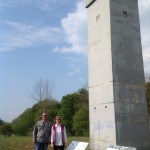
And later that evening, Sabrina picked me up, and off we went again, to one of the old town pubs. An impromptu Pub Night with a small group of the students I had spoken to in the last three days. It was the eve of a holiday weekend. So only a few showed up. We sat about and talked, like old friends. Relaxed. Drank a glass or two of beer. It was all good.
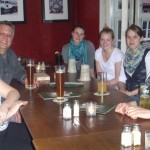
And that was my experience at Leuphana University. I’m thinking it sure would be a lot of fun to go back and do it all over again sometime.
**************************************
Next post: To Muenster and Mainz
Share




























